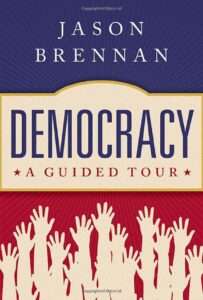
Georgetown political philosopher Jason Brennan is one of the world's leading theorists of democracy, and his new book Democracy: A Guided Tour is a valuable overview of the strengths and weaknesses of democracy, and various arguments on that topic developed by leading political thinkers from ancient Greece to the present day. Brennan has an impressive command of the relevant literature, and he's a very clear writer. The book is a great resource for anyone interested in debates about democratic theory.
Democracy: A Guide Tour is divided into five sections, each of which considers a leading traditional rationale for democracy: stability, virtue, wisdom in decision-making, liberty, and equality. Each section includes a chapter outlining arguments holding that the democracy effectively promotes the value in question, followed by one outlining reasons for skepticism.
One of the strengths of Brennan's book is that he carefully avoids the widespread tendency to conflate that which is "democratic" with that which is good. This leaves room for the possibility that increasing democracy might actually cause harm, as opposed to defining it away in advance.
Brennan himself is something of a democracy-skeptic, as evidenced by his previous work. But in Guided Tour, he strives hard to be balanced, and mostly succeeds. Still, it's hard to come away from the book without getting a sense that democracy falls well short of at least the more expansive claims on its behalf. For example, far from promoting careful deliberation over policy and making effective use of the "wisdom of crowds," democracy is often plagued by systematic voter ignorance and bias. Far from making citizens more virtuous, democratic political participation often brings out and exacerbates some of the worst tendencies in human nature. And so on.
I myself am also skeptical of many of the benefits claimed for democracy, especially when it comes to issues related to voter ignorance. It's possible that a reader who comes to the book with the opposite predisposition will view it differently. Either way, the book provides an excellent analysis of a wide range of perspectives on these issues. And it manages to cover a lot of ground in a relatively modest amount of space.
Despite its many strengths, Guided Tour does have a few notable limitations. First, while Brennan carefully considers strengths and weaknesses of democracy in an absolute sense, there is little in the way of comparison between democratic and non-democratic regimes. Brennan discusses a number of thinkers who reject democracy in favor of authoritarianism, but says little about the actual performance of the sorts of regimes they advocate.
Incorporating the latter would make democracy look better on many dimensions. For example, as Brennan explains in Chapter 9, democracy is often a threat to liberty. But authoritarian governments are far worse. For all their many injustices, no democratic government has even come close to the level of oppression perpetrated by communist and fascist regimes. Similarly, a dictator who listens mainly to boot-licking cronies who tell him what he wants to hear will often make even worse cognitive errors than ignorant democratic electorates. Vladimir Putin's recent disastrous miscalculations may be a case in point.
Brennan is aware of the relative superiority of democratic regimes over authoritarian ones. But it gets little mention in this book, perhaps because the author had to cover so much other ground. Still, I think this issue deserved more attention. The relative failure to consider it may lead readers to (wrongly) dismiss Brennan's more democracy-skeptical chapters by citing Winston Churchill's famous statement that "democracy is the worst form of government – except for all the others that have been tried."
This ties into Brennan's second notable omission: there is very little discussion of various institutional structures that can potentially mitigate the flaws of democracy, such as federalism, separation of powers, and judicial review. In a previous book, Brennan himself advocates "epistocracy," giving more power to relatively more knowledgeable voters (see my assessment of the idea here). It's only briefly mentioned here, as part of a discussion of John Stuart Mill.
Many of these institutional fixes—most obviously, judicial review—are actually constraints on democracy (defined as majoritarian government). Thus, to the extent they are effective, they don't necessarily vindicate democracy, as such. But there is still a crucial difference between structures that limit democracy and those that dispense with it entirely. If nothing else, the potential benefits of the former undercut Churchill-quoting complacency about the democracy, which is often implicitly premised on the assumption that authoritarianism is the only alternative to giving democratic majorities a virtual blank check to rule as they please.
In sum, Democracy: A Guided Tour is a great overview of various longstanding debates about democracy. But it leaves room for a broader tour that more fully considers non-democratic alternatives to democracy and institutional fixes for various democratic pathologies.
The post Jason Brennan's "Democracy: A Guided Tour" appeared first on Reason.com.







